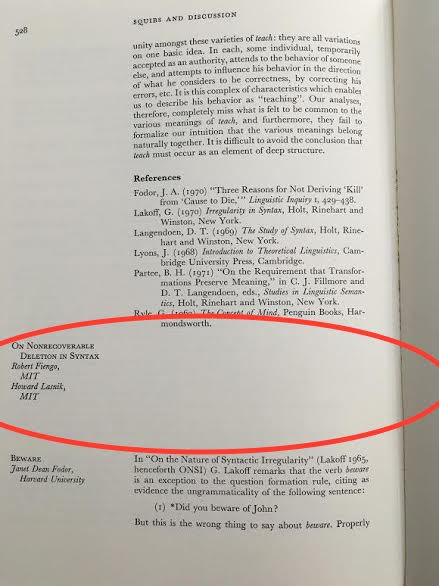The New Shortest Science Paper
Real Clear Science has pointed out a clever example of the shortest possible academic article. It’s called “On nonrecoverable deletion in syntax,” and was published in 1972 in Linguistic Inquiry. They quote University of Texas associate professor John T. Beavers, who sent in the image above with an explanation:
The 1960s and 1970s saw a growth of work on the syntax of natural languages due to the groundbreaking work of Noam Chomsky, who began a research program known as Generative Grammar that sought to describe and explain the knowledge speakers have of their native languages through explicit formalization and hypothesis testing. One phenomenon that has received attention is ellipsis, i.e. when words are left out of a sentence but the information that is unexpressed is still inferred semantically. An example is “verb phrase ellipsis” where the main verb phrase of a clause is left out, as in the second clause in “John will be here tomorrow but Mary won’t.” In the given context it’s clear that there’s an implicit “be here tomorrow” after “won’t”.
One way of analyzing this is to assume that in some underlying mental representation of the sentence the verb phrase “be here tomorrow” is actually present after “won’t” (accounting for the fact that that’s how we interpret it), but its overt phonetic form is deleted when uttered because the information is recoverable from earlier in the same sentence (the previous mention of the verb phrase “will be here tomorrow”, the antecedent of the ellipsis). It had furthermore been hypothesized that deletion in syntax of this sort could only ever happen if there was an explicit antecedent, a rule of grammar called the Recoverability Condition on Deletion, first proposed by Jerrold J. Katz and Paul M. Postal in 1964 and developed by others later. It had a lot of intuitive appeal — what would it mean to leave out something while giving no clue as to what you left out?
Then, in 1972, Linguistic Inquiry published the Fall issue of its 3rd volume, and on page 528 was a paper called “On nonrecoverable deletion in syntax” by Robert Fiengo and Howard Lasnik on exactly this topic. Indeed, some people who saw the title might have thought, “Ah! Somebody found an instance of nonrecoverable deletion! Unexpressed material without an antecedent! A violation of the Recoverability Condition! I wonder how that works.” In fact, that’s exactly what I thought in 2002 as a grad student when I stumbled across the title. I quickly ran to the library to get the journal out, and I flipped it to page 528 to begin reading.
It was instead a clever joke, and a striking argument in FAVOR of the Recoverability Condition.
The point of the article was to argue for the recoverability condition by violating it in a rather spectacular (and cheeky) way, thus demonstrating the effect.
lmao i’m glad the archives of linguistic inquiry i’ve had to go through for work don’t go back to 1972 or else i probably would have flown into a panic trying to find the text of this paper because clearly it’s missing from our site for some reason
